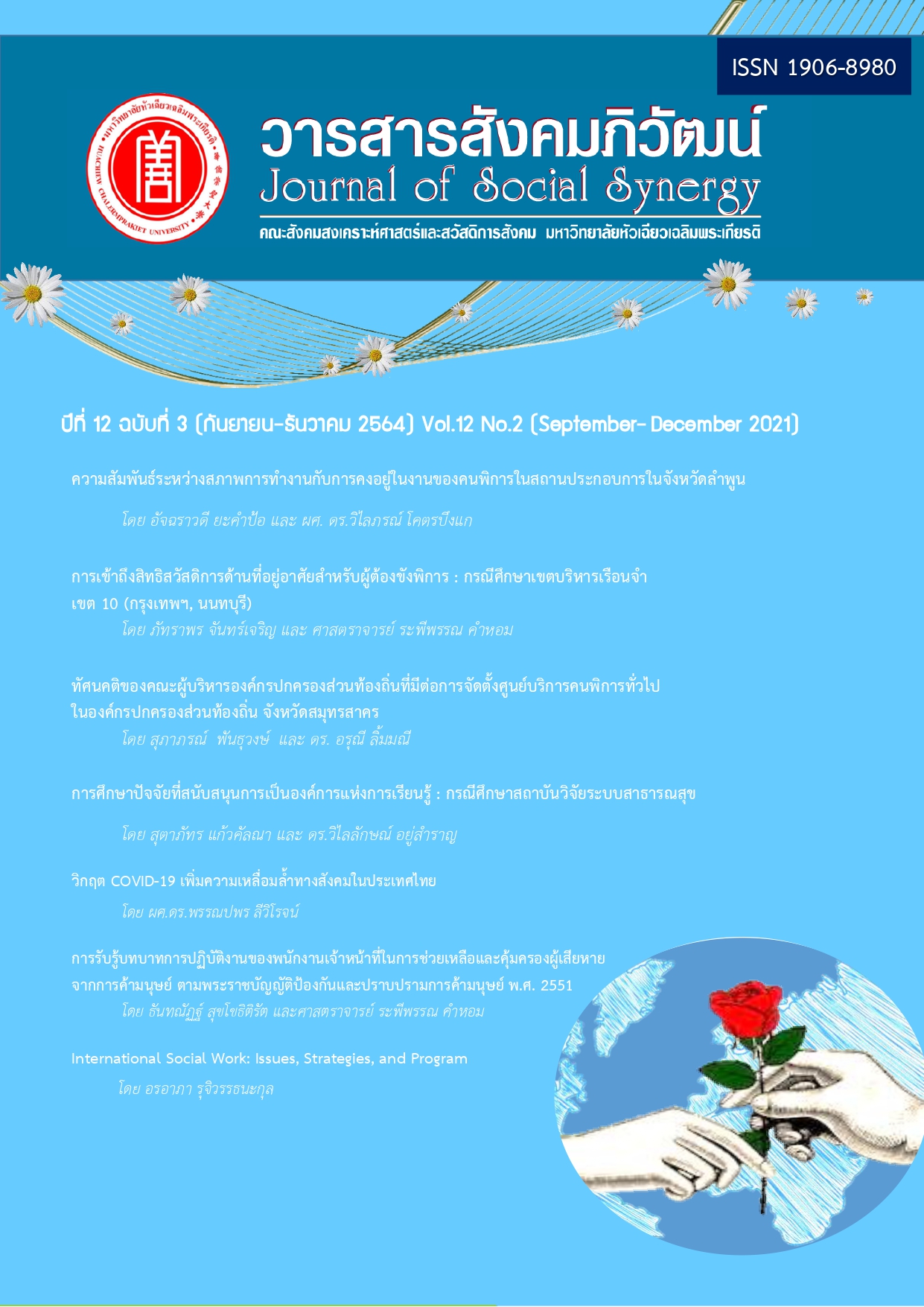Factors Supporting Learning Organization : A Case Study Health Systems Research Institute
Keywords:
Learning Organization, Factors Supporting Learning Organization, Health Systems Research InstituteAbstract
The research aimed to: 1) to study the level of being a learning organization of the Health Systems Research Institute; and 2) to study the relationship between the factors supporting the being a learning organization to the level of being a learning organization of the Health Systems Research Institute. The research employs the quantitative research; the samples were 108 personnel of the Institute of Health Systems Research, obtained by simple random sampling. The research instruments were questionnaires to measure the level of being a learning organization and the factors that supported learning organization in 4 factors. The data were analyzed by the descriptive statistics and analyzed correlation direction by Pearson’s Product Moment Correlation Coefficient with the level of statistical significance at .05.
The results of this study revealed that the Health Systems Research Institute has a high level of being a learning organization. When considering each aspect, it was found that Personnel are aware of the elements of a learning organization in leadership that reinforcing learning and the supportive learning environment was at a high level, respectively, while the concrete learning processes and practices were at a moderate level. For the study of the relationship between the factors supporting the being a learning organization and the level of being a learning organization of the Institute of Health Systems Research, it was found that the 4 factors supporting the learning organization were organizational culture factors; Organizational Atmosphere Factors transformational leadership factors and human resource management factors There was a high level of positive correlation with being a learning organization of the Health Systems Research Institute.
The recommendations from study consisted of policy recommendations for the development of the Health Systems Research Institute: Organizations should create and manage a body of knowledge to collect information systematically, develop the potential of personnel to be ready to learn at all times; and develop mechanisms to support organizational management to accommodate changes. For practical recommendations, Health Systems Research Institute should establish a Knowledge Management Center (KM Center) as a center for gathering knowledge including developing tools/information systems that support efficient operations, training to develop personnel's potential to be strong; and develop an organizational development plan or strategic plan that focuses on the factors supporting the organization of learning.
References
1. กัญญ์ภัสสร ชาติชัยประเสริฐ. (2553). สุนทรียศาสตร์กับการพัฒนาทรัพยากรมนุษย์ เพื่อการพัฒนาประเทศไทยสู่การเป็นสังคมแห่งการเรียนรู้. วารสารพัฒนบริหารศาสตร์, 50(3), 21-41.
2. เกศรี ลีลาศรีบรรจง. (2554). การประเมินองค์การแห่งการเรียนรู้ของสำนักงานพัฒนาวิทยาศาสตร์และเทคโนโลยี. วิทยานิพนธ์ปริญญาวิทยาศาสตรมหาบัณฑิต สาขาเทคโนโลยีการบริหาร คณะพัฒนาทรัพยากรมนุษย์ สถาบันบัณฑิตพัฒนบริหารศาสตร์.
3. คณิศร บุญทวีวัฒน์. (2556). มิติวัฒนธรรมองค์กร การบริหารทรัพยากรมนุษย์เพื่อไปสู่การเป็นองค์กรแห่งการเรียนรู้. การค้นคว้าอิสระปริญญาบริหารธุรกิจมหาบัณฑิต คณะพาณิชยศาสตร์และการบัญชี มหาวิทยาลัยธรรมศาสตร์.
4. ฉันทนา บุญชู. (2554). ปัจจัยที่เอื้อต่อการเป็นองค์การแห่งการเรียนรู้ของข้าราชการโรงพยาบาลนครปฐม. วิทยานิพนธ์ปริญญาศิลปศาสตรมหาบัณฑิต สาขาวิชาการจัดการภาครัฐและภาคเอกชน คณะวิทยาการจัดการ มหาวิทยาลัยศิลปากร.
5. ชุตินันท์ มุ่งการนา. (2561). ภาวะผู้นำการเปลี่ยนแปลง วัฒนธรรมองค์การ องค์การแห่งการเรียนรู้ กับประสิทธิภาพของเทศบาลนคร. ดุษฎีนิพนธ์ปริญญาปรัชญาดุษฎีบัณฑิต สาขาวิชารัฐประศาสนศาสตร์ มหาวิทยาลัยบูรพา.
6. นฤมล พุ่มจันทร์. (2551). วิธีการพัฒนาพนักงานขององค์การแห่งการเรียนรู้. วิทยานิพนธ์ปริญญาศึกษาศาสตรมหาบัณฑิต สาขาวิชาการศึกษาผู้ใหญ่และการศึกษาต่อเนื่อง บัณฑิตวิทยาลัย มหาวิทยาลัยมหิดล.
7. นรีนาถ กาญจนเจตนี. (2560). กระบวนการบริหารทรัพยากรมนุษย์กับความสุขในการทำงาน : กรณีศึกษากรมหม่อนไหม กระทรวงเกษตรและสหกรณ์. วิทยานิพนธ์ปริญญาวิทยาศาสตรมหาบัณฑิต สาขาการพัฒนาทรัพยากรมนุษย์และองค์การ คณะพัฒนาทรัพยากรมนุษย์ สถาบันบัณฑิตพัฒนบริหารศาสตร์.
8. ปิยะ ศักดิ์เจริญ. (2558). องค์ประกอบสำคัญที่ช่วยส่งเสริมการเรียนรู้ตลอดชีวิต. วารสารครุศาสตร์, 43(2), 141-154.
9. พรฑิตา อังกินันทน์. (2560). แนวทางการพัฒนาองค์การประเภทธุรกิจธนาคารสู่องค์การแห่งการเรียนรู้ กรณีศึกษา ธนาคารกรุงเทพ จำกัด (มหาชน). วิทยานิพนธ์ปริญญาวิทยาศาสตรมหาบัณฑิต สาขาการพัฒนาทรัพยากรมนุษย์และองค์การ
คณะพัฒนาทรัพยากรมนุษย์ สถาบันบัณฑิตพัฒนบริหารศาสตร์.
10. ภูริกานต์ วัจน์ประภาศักดิ์. (2557). ภาวะผู้นำเชิงจิตวิญญาณ บุคลิกภาพห้าองค์ประกอบ วัฒนธรรมองค์การ และผลการปฏิบัติงานของพนักงานระดับบังคับบัญชาในอุตสาหกรรมกระดาษแห่งหนึ่ง ในจังหวัดกาญจนบุรี. วิทยานิพนธ์ปริญญาวิทยาศาสตรมหาบัณฑิต สาขาวิชาจิตวิทยาอุตสาหกรรมและองค์การ มหาวิทยาลัยมหิดล.
11. รพีพัฒน์ ศรีสิลารักษ์. (2559). การรับรู้บรรยากาศองค์การและพฤติกรรมการเป็นสมาชิกที่ดีขององค์การของพนักงานประจำสังกัดสายทรัพยากรบุคคลและกำกับกิจกรรมองค์การ บริษัท การบินไทย จำกัด (มหาชน). วารสารปริทัศน์, 8(1) : 61-83.
12. รัตนา แสงจันทร์. (2559). ความสัมพันธ์ระหว่างภาวะผู้นำการเปลี่ยนแปลงของผู้บริหารสภานศึกษากับการเป็นองค์การแห่งการเรียนรู้ของโรงเรียนประถมศึกษา อำเภอคลองใหญ่ สังกัดสำนักงานเขตพื้นที่การศึกษาประถมศึกษาตราด. งานนิพนธ์ปริญญาการศึกษาศาสตรมหาบัณฑิต สาขาวิชาการบริหารการศึกษา คณะศึกษาศาสตร์ มหาวิทยาลัยบูรพา.
13. รุ้งนภา จันทร์ลี. (2562). ภาวะผู้นำการเปลี่ยนแปลงของผู้บริหารสถานศึกษาที่ส่งผลต่อการเป็นองค์การแห่งการเรียนรู้ของสถานศึกษา สังกัดสำนักงานเขตพื้นที่การศึกษาประถมศึกษาจันทบุรี เขต 2. วิทยานิพนธ์ปริญญาครุศาสตรมหาบัณฑิต สาขาวิชาการบริหารการศึกษา บัณฑิตวิทยาลัย มหาวิทยาลัยราชภัฎรำไพพรรณี.
14. สมบัติ กุสุมาวลี. (2553). เศรษฐกิจบนฐานความรู้: ฐานสำคัญของเศรษฐกิจเชิงสร้างสรรค์. For Quality, 156(7) : 106-111.
15. สกาวรัตน์ พานชูวงศ์. (2557). ลักษณะวัฒนธรรมองค์กรแห่งการเรียนรู้ที่ส่งผลต่อความสำเร็จของการจัดการความรู้. คณะสังคมศาสตร์และมนุษยศาสตร์ มหาวิทยาลัยมหิดล. วิทยานิพนธ์ปริญญาศิลปศาสตรมหาบัณฑิต สาขาวิชารัฐประศาสนศาสตร์ มหาวิทยาลัยมหิดล.
16. สุภะรัฐ ยอดระบำ. (2561). การมุ่งสู่องค์การแห่งการเรียนรู้ : กรณีศึกษาเทศบาลตำบลเกาะคา เทศบาลเมืองกระบี่ และเทศบาลนครขอนแก่น. วิทยานิพนธ์ปริญญารัฐศาสตรดุษฎีบัณฑิต สาขาวิชารัฐศาสตร์ คณะรัฐศาสตร์ จุฬาลงกรณ์มหาวิทยาลัย.
17. สุวิธิดา จรุงเกียรติกุล. (2561). สังคมแห่งการเรียนรู้ตลอดชีวิต (A Lifelong Learning Society). สืบค้นจาก https://www.trueplookpanya.com/blog/content/66056/-teaartedu-teaart-teaarttea-.
18. ศิริวิมล โพธิ์ไข่. (2560). ความสัมพันธ์ระหว่างวัฒธรรมองค์การกับองค์การแห่งการเรียนรู้ของโรงเรียนในสังกัดสำนักงานเขตพื้นที่การศึกษาประถมศึกษาสระแก้ว เขต 1. งานนิพนธ์ปริญญาศึกษาศาสตรมหาบัณฑิต สาขาวิชาการบริหารการศึกษา
คณะศึกษาศาสตร์ มหาวิทยาลัยบูรพา.
19. อนพัทย์ พูลสวัสดิ์. (2563). ตัวแบบวัฒนธรรมองค์การแห่งความยั่งยืน. วารสารเครือข่ายส่งเสริมการวิจัยทางมนุษยศาสตร์และสังคมศาสตร์, 3(3), 112.
20. อภิชาญ ทองใบ. (2558). ความสัมพันธ์ระหว่างบรรยากาศองค์การ ภาวะผู้นำการเปลี่ยนแปลง กับความเป็นองค์การแห่งการเรียนรู้ ตามการรับรู้ของบุคลากรที่ปฏิบัติงานในหน่วยงาน สังกัดกรมควบคุมโรค กระทรวงสาธารณสุข. วิทยานิพนธ์ปริญญาวิทยาศาสตรมหาบัณฑิต สาขาสาธารณณสุขศาสตร์ มหาวิทยาลัยมหิดล.
ภาษาต่างประเทศ
21. David M. Garvin, et al. (2008). Is Yours a Learning Organization? Harvard Business Review, 86(3), 109-116.
22. Ford, D. F. (1997). Toward a learning organization: Guidelines for bureaucracies. Master’s thesis, Memorial University of Newfoundland. Dissertation Abstracts International, AAT MQ23134.
23. Garrate, B. (1990). An old idea that has come of age. People Management, 1(19), 25.
24. Goh, Swee C.. (1998). Toward a learning organization: The strategic building blocks. SAM Advanced Management Journal, 63(2), 15-22.
25. Kaiser, Sandra M. (2000). Mapping the Learning Organization : Exploring A Model of Organizational Learning. Dissertation for the Degree of Doctor of Philosophy of the Louisiana State University.
Downloads
Published
How to Cite
Issue
Section
License
บทความที่ได้รับการตีพิมพ์เป็นลิขสิทธิ์ของวารสารสังคมภิวัฒน์ มหาวิทยาลัยหัวเฉียวเฉลิมพระเกียรติ
ข้อความที่ปรากฏในบทความแต่ละเรื่องในวารสารวิชาการเล่มนี้เป็นความคิดเห็นส่วนตัวของผู้เขียนแต่ละท่านไม่เกี่ยวข้องกับมหาวิทยาลัยหัวเฉียวเฉลิมพระเกียรติ และคณาจารย์ท่านอื่นๆในมหาวิทยาลัยฯ แต่อย่างใด ความรับผิดชอบองค์ประกอบทั้งหมดของบทความแต่ละเรื่องเป็นของผู้เขียนแต่ละท่าน หากมีความผิดพลาดใดๆ ผู้เขียนแต่ละท่านจะรับผิดชอบบทความของตนเองแต่ผู้เดียว




